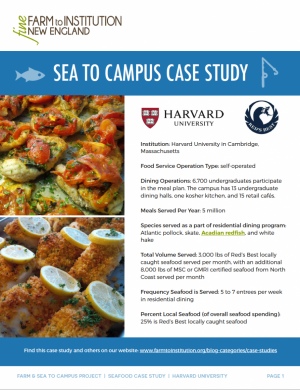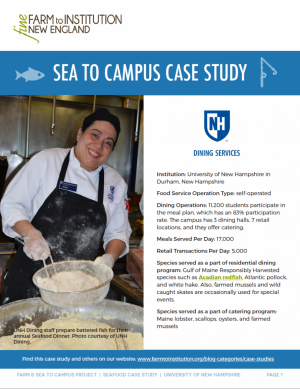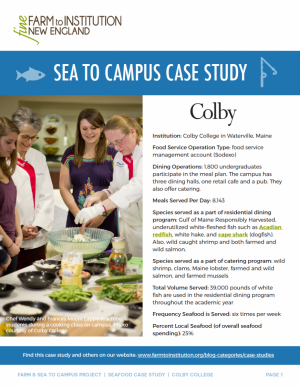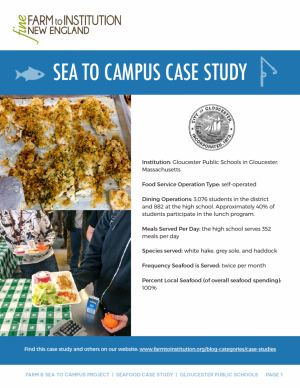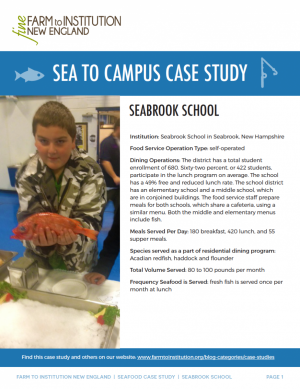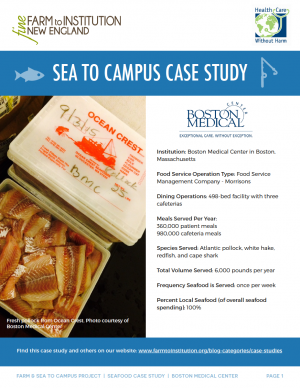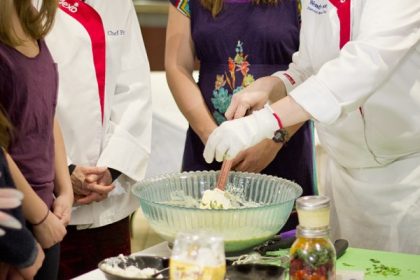
This post was originally published on Farm to Institution New England’s blog.
Case Study Series Highlights Local Seafood at Colleges, Schools & a Hospital in New England
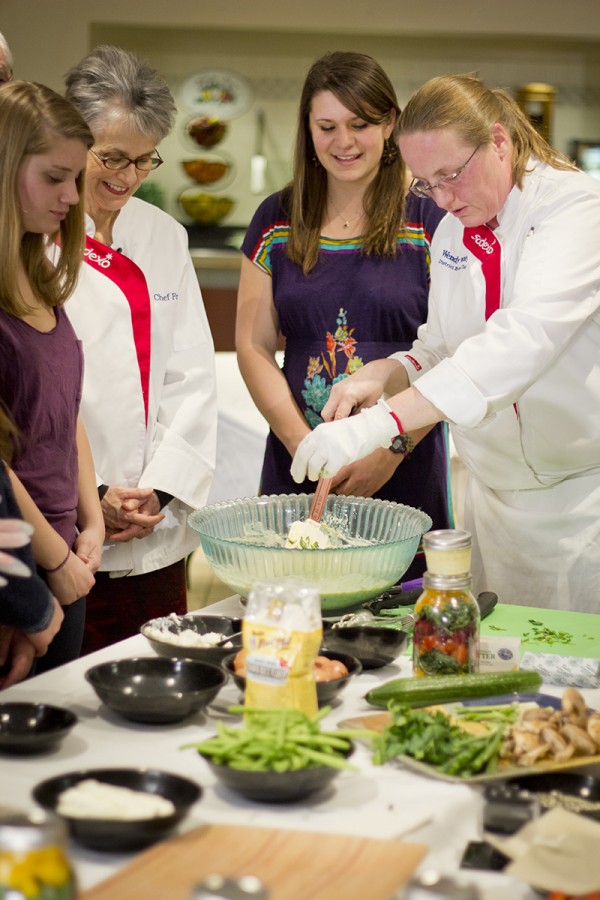 Photo: Chef Wendy and Frances Moore Lappe teaching students during a cooking class on campus. Courtesy of Colby College.
Photo: Chef Wendy and Frances Moore Lappe teaching students during a cooking class on campus. Courtesy of Colby College.
At institutions throughout New England, dining staff are beginning to look to the sea as another source for local foods. Institutions from across health care, colleges & universities, and K-12 school systems are incorporating locally caught seafood into their meals for a variety of reasons and through a variety of procurement models. FINE set out to create a series of case studies that explores exactly how and why institutions are serving up locally caught seafood. We also asked what lessons these sea to institution pioneers might have to share with institutions that haven’t yet developed local seafood programs.
These case studies highlight models from three higher education institutions, two public K-12 schools, and one hospital. The following institutions represent small and large sites, rural and urban locations, and the two primary management structures (self-operated dining programs and programs contracted with a food service management company):
HIGHER EDUCATION
Harvard University | Cambridge, MA
University of New Hampshire | Durham, NH
Colby College | Waterville, ME
PUBLIC K-12 SCHOOLS
Gloucester High School | Gloucester, MA
Seabrook School | Seabrook, NH
HEALTH CARE
Boston Medical Center | Boston, MA
Why source local seafood?
While the institutional demographics may be different, the institutions themselves cited many of the same reasons for initiating a local seafood program. These include:
- Meeting sustainability goals
- Responding to customer interest and engagement
- Learning more about sustainable and local options from existing or potential vendors
- Supporting local fisheries with institutional dollars
- Providing healthier protein options on the menu
- Providing new menu options
- Higher-quality, fresh products
- Providing good educational opportunities for customers
Many of these institutions noted that the price per pound of seafood is more expensive than other protein options, yet they want to support and grow their use of these products due to the other reasons listed above.
Choosing Seafood
Institutions use a variety of criteria to determine whether a particular product meets their local and/or sustainable seafood criteria. In several cases they have chosen to rely on third party certifiers such as the Gulf of Maine Research Institute (GMRI) or Marine Stewardship Council (MSC). Harvard is the only institution which has worked with a seafood expert to develop their own set of criteria for evaluating a fish purchase. While this criteria includes existing certifications such as GMRI and MSC, it is not limited to these criteria. Most of the profiled institutions have chosen not to fully certify their own operations. Colby College has been licensed by the Gulf of Maine Research Institute to serve Gulf of Maine Responsibly Harvested products for the 2015-16 Academic Year.
In order to source traceable product (either to a particular fishery or directly to a boat) several institutions began working with new distributors. Their existing seafood suppliers were often not providing them with the level of traceability they needed to evaluate their purchases. These case studies demonstrate a strong market for products that are traceable to the boat and highlight the small number of distributors providing this service.
The Impact
Each of these institutions sees opportunities for growth in their seafood programs. The percent of their purchases (for those that are tracking) coming from regional sources ranges from 25% all the way to 100%. At some of the larger institutions this can represent tens of thousands of pounds annually. If more institutions follow the lead of these seafood pioneers and commit to sourcing sustainable, regionally caught seafood, they could provide significant economic support to New England fishermen and fishing communities.
Do you know an institution that’s doing great work with local seafood? If so, contact us at riley@farmtoinstitution.org.
More Information
FINE’s Farm & Sea to Campus Project aims to increase the amount of local food served in colleges and universities. Get connected with the New England Farm and Sea to Campus Network by visiting www.farmtoinstitution.org/farm-college.
Additional resources about New England fisheries are available at the following links:
- Gulf of Maine Research Institute
- Northwest Atlantic Marine Alliance
- Marine Stewardship Council – find certified fisheries in our region on their map
- Coastal Enterprises, Inc. (CEI) Sustainable Fisheries/Aquaculture Program
Simca Horwitz is co-coordinator for the Farm to Campus Project with Farm to Institution New England (FINE). She also works as Eastern Mass Program Director for Massachusetts Farm to School. Simca assists FINE with farm to campus efforts in Southern New England (MA, CT and RI) and development of the Farm to Campus Network.

